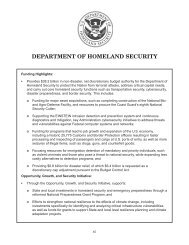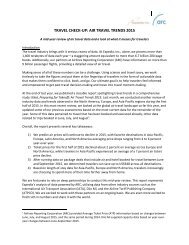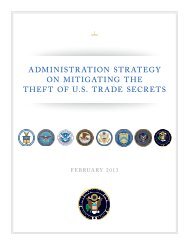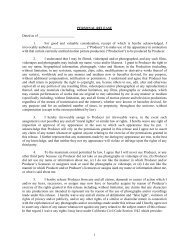A-HRC-13-42
You also want an ePaper? Increase the reach of your titles
YUMPU automatically turns print PDFs into web optimized ePapers that Google loves.
A/<strong>HRC</strong>/<strong>13</strong>/<strong>42</strong><br />
page 2<br />
Summary<br />
The present joint study on global practices in relation to secret detention in the context of<br />
countering terrorism was prepared, in the context of their respective mandates, by the Special<br />
Rapporteur on the promotion and protection of human rights and fundamental freedoms while<br />
countering terrorism, the Special Rapporteur on torture and other cruel, inhuman or degrading<br />
treatment or punishment, the Working Group on Arbitrary Detention (represented by its Vice-<br />
Chair), and the Working Group on Enforced and Involuntary Disappearances (represented by its<br />
Chair). Given that the violation of rights associated with secret detention fell within their<br />
respective mandates, and in order to avoid duplication of efforts and ensure their complementary<br />
nature, the four mandate holders decided to undertake the study jointly.<br />
In conducting the present study, the experts worked in an open, transparent manner. They<br />
sought inputs from all relevant stakeholders, including by sending a questionnaire to all States<br />
Members of the United Nations. Several consultations were held with States, and the experts<br />
shared their findings with all States concerned before the study was finalized. Relevant excerpts<br />
of the report were shared with the concerned States on 23 and 24 December 2009.<br />
In addition to United Nations sources and the responses to the questionnaire from 44<br />
States, primary sources included interviews conducted with persons who had been held in secret<br />
detention, family members of those held captive, and legal representatives of detainees. Flight<br />
data were also used to corroborate information. In addition to the analysis of the policy and legal<br />
decisions taken by States, the aim of the study was also to illustrate, in concrete terms, what it<br />
means to be secretly detained, how secret detention can facilitate the practice of torture or<br />
inhuman and degrading treatment, and how the practice of secret detention has left an indelible<br />
mark on the victims, and on their families as well.<br />
The study initially describes the international legal framework applicable to secret<br />
detention. At the outset, an explanation is given of the terminology used for the purpose of the<br />
study on what constitutes secret detention in the context of countering terrorism. The legal<br />
assessment concludes that secret detention is irreconcilably in violation of international human<br />
rights law, including during states of emergency and armed conflict. Likewise, it is in violation<br />
of international humanitarian law during any form of armed conflict.<br />
Secret detention violates the right to personal liberty and the prohibition of arbitrary arrest<br />
or detention. No jurisdiction should allow for individuals to be deprived of their liberty in secret<br />
for potentially indefinite periods, held outside the reach of the law, without the possibility of<br />
resorting to legal procedures, including habeas corpus. Secret detainees are typically deprived of<br />
their right to a fair trial when State authorities do not intend to charge or try them. Even if<br />
detainees are criminally charged, the secrecy and insecurity caused by the denial of contact to the<br />
outside world and the fact that family members have no knowledge of their whereabouts and fate<br />
violate the presumption of innocence and are conducive to confessions obtained under torture or<br />
other forms of ill-treatment. At the same time, secret detention amounts to an enforced<br />
disappearance. If resorted to in a widespread or systematic manner, secret detention may even<br />
reach the threshold of a crime against humanity.<br />
Every instance of secret detention is by definition incommunicado detention. Prolonged<br />
incommunicado detention may facilitate the perpetration of torture and other cruel, inhuman or
















